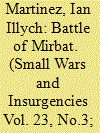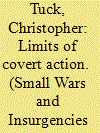| Srl | Item |
| 1 |
ID:
113214


|
|
|
|
|
| Publication |
2012.
|
| Summary/Abstract |
On 19 July 1972, the pivotal battle of the Dhofar rebellion occurred when over 250 communist guerillas, called adoos,1
attacked the coastal garrison town of Mirbat2 where nine men of the British 22nd Special Air Service Regiment were stationed. Their decisive defense of Mirbat led to decorations three years after the battle, the beginning of the end of the rebellion, and calls for the awarding of Britain's highest honor, the Victoria Cross. The Battle of Mirbat, let alone the Dhofar rebellion are little known outside the UK due3 to the covert nature of the SAS deployment, the then Labour government's obsession with secrecy, and the remoteness of the area of operations. Nonetheless, of all the proxy wars of the Cold War this one had the most significance, because had the communist adoos won, Oman and its Musandam Peninsula, which sticks out like a dagger into the Straits of Hormuz and abuts the United Arab Emirates, would have fallen into the communist orbit; threatening the West's oil supply. This is the story of the pivotal battle that was won by Britain and Oman against a communist insurgency.
|
|
|
|
|
|
|
|
|
|
|
|
|
|
|
|
| 2 |
ID:
148046


|
|
|
|
|
| Summary/Abstract |
This article evaluates the performance of the Special Air Service (SAS) during secret cross-border raids conducted as part of Britain’s undeclared war against Indonesia from 1963–1966. The analysis reviews the existing debate on the SAS’ performance during this campaign; it looks more closely at how military effectiveness might be defined; and it then examines, using the SAS’ own operations reports, the nature of their activities and their success or failure. This article concludes that critics of the SAS’ effectiveness during Confrontation are right; but for the wrong reasons. SAS operations did indeed have less effect than orthodox accounts would have it. But the reasons for this lay not in their misuse but in the exigencies of British strategy. This article demonstrates an enduring truth – no matter how ‘special’ a military force might be, tactical excellence cannot compensate reliably for problems in strategy.
|
|
|
|
|
|
|
|
|
|
|
|
|
|
|
|